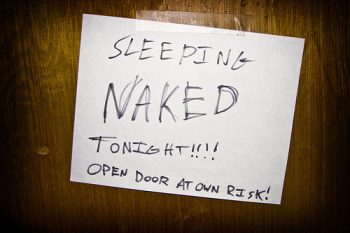Contributing writer for Wake Up World
Can sleeping naked improve your sleep and health? Evidence suggests that, yes, ditching your sleepwear may in fact have a number of benefits, including better sleep. Interestingly enough, a mere 8 percent of Americans admit to sleeping naked.[1]
Many of these health benefits result from the fact that sleeping naked helps prevent overheating, which can have a significant impact on your sleep quality. As you fall asleep, your body temperature drops, and this drop in core temperature actually helps you sleep better.
As you wake, your body temperature rises, which is why it’s much more difficult to fall asleep and stay asleep when you’re hot.
Many keep their homes too warm to begin with, and wearing pajamas to bed will make you even warmer, which can lead to restless sleep and frequent waking. Ideally, keep the temperature in your bedroom below 70 degrees F. Studies show that the optimal room temperature for sleep is between 60 to 68 degrees.
One study showed a surface skin temperature difference of as little as 0.08 degrees F (or 0.4 degrees C) allowed subjects to sleep more soundly. But the benefits of sleeping in the buff don’t end there.
Surprising Health Benefits of Sleeping Naked
Other health benefits of sleeping naked include:[2],[3],[4],[5]
Improved metabolism
Lowering your body temperature helps activate brown fat — a type of body fat that helps regulate your body temperature by generating heat.
Research shows that people with higher levels of brown fat have faster resting metabolic rates, better blood sugar control and higher insulin sensitivity. In one study, sleeping in a chilled room doubled the amount of brown fat participants produced.[6]
Improved blood circulation
Without clothing your blood flow is less restricted, which benefits your entire body, especially your heart and muscles.
Healthier skin and private parts
Bacteria thrive in warm, moist areas, so ditching clothing, including underwear, can be particularly beneficial for women prone to yeast infections. Other areas, including your armpits (and skin in general) also benefit from being able to breathe.
Improved sex life
Skin-to-skin contact (as well as orgasm) releases the “bonding” hormone oxytocin, which promotes feelings of attachment and emotional closeness. Since sexual contact typically occurs while naked, sleeping in the nude raises the chances of sex, which can bring a couple closer.
Balancing hormones
By allowing your body to stay cooler at night, sleeping naked helps decrease cortisol, increase growth hormone and balance melatonin, all of which help promote healthy sleep patterns and reduce anxiety, stress and food cravings.
Improving Your Sleep Helps Improve Brain Health
Besides information on sleeping in the nude, the Global Council on Brain Health (GCBH) recently issued a number of daytime, evening and nighttime recommendations that can help you get more quality sleep, which is important for brain detoxification (which only occurs during deep sleep) and cognitive health. These tips include:[7],[8]
Keep a regular morning and evening routine
Get up at the same time every day, seven days a week, and keep a regular bedtime routine. When you establish a consistent, soothing bedtime routine, you’re more likely to fall asleep easily. Activities such as a warm bath, reading a good book or relaxation exercises can be helpful.
Keeping a regular exercise schedule will also help optimize your sleep cycle. Seek to get to bed before 10 p.m. if possible to optimize your chronobiological cycles.
Avoid stimulants
Restrict fluids and food for at least three hours before bedtime. Avoiding dinner at least three hours before bed will also promote mitochondrial health, as explained in my previous article, “Two Meals a Day Is Ideal.”
Avoid alcohol and nicotine four to six hours before going to bed, and if you’re sensitive to caffeine, avoid drinking coffee and caffeine-containing drinks after lunch. (Extremely sensitive people may even need to abstain from chocolate in the afternoon/evening.)
Remove electronics from your bedroom
This includes TVs, telephones, computers and tablets, as the blue light emitted from electronic screens suppress melatonin production, making sleep elusive.
Limit daytime naps to less than 30 minutes
Make your bedroom a pet-free zone
While many enjoy having pets sleep with them, allowing pets in your bed can disrupt your sleep.
Optimize your light exposure, day and night
In the morning and early afternoon, expose yourself to bright daylight to anchor and synchronize your circadian clock and melatonin production. Bright light exposure during the day is particularly important if you have trouble falling asleep at night or suffer from insomnia.
In general it is best to avoid blue light sources, such as LEDs and electronics, as blue light suppresses melatonin production. This is especially important after sunset.
These light sources become less troublesome if you use a good filter on your computer screen. My favorite is Iris, which was developed by a Bulgarian programmer named Daniel Georgiev.
He recently gave a TEDx talk that describes this very inexpensive program. He’s also developed a version for iPads.
Swap out the light bulbs you use most regularly and replace them with clear incandescent light bulbs. Candles are an even healthier light source, as our ancestors have been using them for many thousands of years.
Another solution I’ve found that I think works even better is to simply wear amber-colored glasses that block blue light in the evening. I found an Uvex model (S1933X) on Amazon that costs less than $9.
Once you have your glasses on, it doesn’t matter what light sources you have on in your house. The moment sunset comes, I put on these glasses and I have noticed dramatic improvement since doing this.
My vision has radically improved and at 62 years of age, I don’t require reading glasses.
Keep bedroom dark, cool and quiet
In addition to lowering the thermostat, make your bedroom as dark and quiet as possible. Research shows even very dim light exposure during sleep can have adverse effects on your brain function. Ideally, install blackout curtains, or use an eye mask.
Sleep Is Essential for Optimal Health
Sleep affects your health in a myriad of ways. The GCBH naturally places a significant focus on the brain, but sleep is important for your entire body. As for how much sleep you need, research shows most adults need right around eight hours of sleep each night for optimal health and disease prevention. Children and teens need more. Lack of sleep, or poor-quality sleep, has been linked to:
Why Sleeping Pills Are Best Avoided
The GCBH also warns against the use of sleeping pills, noting the potential for side effects, especially for older individuals. Studies have also shown they do little to actually help you sleep more or improve the quality of your sleep. Belsomra, for example, has been shown to help you fall asleep only six minutes sooner than a placebo (on average) and stay asleep just 16 minutes longer — and that was in the company’s own clinical trials.[10]
Meanwhile, nearly 1,000 consumer complaints against Belsomra were filed with the U.S. Food and Drug Administration (FDA) between February and July 2015 alone. Many complained the drug didn’t work. Sleep paralysis, next-day drowsiness and even suicidal thoughts and suicide attempts were reported.
An analysis of studies financed by the National Institutes of Health (NIH) found that sleeping pills like Ambien, Lunesta and Sonata reduced the average time it takes to fall asleep by about 13 minutes compared to placebo, while increasing total sleep time by about 11 minutes.
Interestingly, participants believed they had slept longer, by up to one hour. This is thought to be due to anterograde amnesia, which causes trouble with forming memories. When people wake up after taking sleeping pills, they may simply forget they’d been unable to sleep.
A startling study[11] published in 2012 also revealed that people who take sleeping pills have a 35 percent higher risk for certain cancers, and are nearly 400 percent more likely to die than people who don’t take them. Remarkably, this association held true even if the patients took fewer than 18 sleeping pills a year, equating to taking just one sleeping pill every three weeks. Other health risks associated with sleeping pills include:
- An increased risk for insulin resistance, food cravings, weight gain and diabetes
- Amnesia, even of events that occurred during the day
- Depression, confusion, disorientation and/or hallucinations
- Increased risk of accidents. Studies submitted to the FDA reveal blood levels of zolpidem (found in Ambien and other sleeping pills) above 50 ng/mL may impair your driving, especially among women.[12]
- Sleep aids that contain Benadryl can have a half-life of about 18 hours, so if you take them every night, you’re basically sedated for a large portion of the day as well, resulting in cognitive deficits and accident proneness
- Increased risk for dementia in seniors
- Parasomnias[13] — bizarre behavioral reactions, including sleepwalking and engaging in potentially embarrassing or dangerous tasks while fast asleep, such as driving, having sex, eating (including bizarre things like buttered cigarettes, salt sandwiches or raw bacon), texting or tweeting[14],[15]
For Optimal Health, Prioritize Sleep
Increasing the number of hours you sleep to eight each night and improving the quality of your sleep may significantly improve your overall health, and help reduce your risk for any number of physical and psychological problems. Remember that in order to optimize your sleep, you have to go to bed early enough. If you have to be up by 6:30 a.m., going to bed after midnight is a recipe for sleep deprivation.
Many fitness trackers can now track both daytime body movement and sleep, allowing you to get a better picture of how much sleep you’re actually getting.
Certain ones can even tell you which activities led to your best sleep and what factors resulted in poor sleep. If you struggle with sleep issues, it may be a worthwhile investment. For even more tips to help you clean up your sleep hygiene and improve your sleep, see my previous article, “Want a Good Night’s Sleep? Then Never Do These Things Before Bed.”
Article references: See below.
Recommended articles by Dr. Joseph Mercola:
- How LED Lighting May Compromise Your Health
- Depression is Now the No. 1 Cause of Illness and Disability Worldwide
- Medical Errors: Still the Third Leading Cause of Death
- Photobiology: How Therapeutic Use of Full-Spectrum Light Can Improve Your Health
- Scientific Links Between Processed Foods and Depression
- How Sugar Harms Your Brain Health and Drives Alzheimer’s Epidemic
- The Health Benefits of Intermittent Fasting
- Can a Hug a Day Keep Infection Away?
- The Magic Healing Power of Mushrooms
- 13 Mind-Body Techniques That Can Help Ease Pain and Depression
About the author:
 Born and raised in the inner city of Chicago, IL, Dr. Joseph Mercola is an osteopathic physician trained in both traditional and natural medicine. Board-certified in family medicine, Dr. Mercola served as the chairman of the family medicine department at St. Alexius Medical Center for five years, and in 2012 was granted fellowship status by the American College of Nutrition (ACN).
Born and raised in the inner city of Chicago, IL, Dr. Joseph Mercola is an osteopathic physician trained in both traditional and natural medicine. Board-certified in family medicine, Dr. Mercola served as the chairman of the family medicine department at St. Alexius Medical Center for five years, and in 2012 was granted fellowship status by the American College of Nutrition (ACN).
While in practice in the late 80s, Dr. Mercola realized the drugs he was prescribing to chronically ill patients were not working. By the early 90s, he began exploring the world of natural medicine, and soon changed the way he practiced medicine.
In 1997 Dr. Mercola founded Mercola.com, which is now routinely among the top 10 health sites on the internet. His passion is to transform the traditional medical paradigm in the United States. “The existing medical establishment is responsible for killing and permanently injuring millions of Americans… You want practical health solutions without the hype, and that’s what I offer.”
Visit Mercola.com for more information, or read Dr. Mercola’s full bio and résumé here.
This article first appeared on Mercola.com
Sources and References:
- [1] Cosmopolitan December 28, 2012
- [2] Lifehack.org, 10 Benefits to Sleeping Naked
- [3] Forbes September 13, 2016
- [4] Elite Daily March 2, 2015
- [5] Daily Mail August 12, 2016
- [6], [8] Newsweek January 11, 2017
- [7] Global Council on Brain Health, The Brain-Sleep Connection
- [9] BBC News October 9, 2013
- [10] Huffington Post Highline, Sleep Drug Advertising
- [11] BMJ Open 2012; 2:e000850
- [12] FDA January 10, 2013
- [13] Dark Side of Sleeping Pills March 2013
- [14] Daily Mail August 23, 2013
- [15] KOMO News September 4, 2013
Source Article from https://wakeup-world.com/2017/07/09/the-many-health-benefits-of-sleeping-naked/
Related posts:
Views: 0
 RSS Feed
RSS Feed

















 July 8th, 2017
July 8th, 2017  Awake Goy
Awake Goy 

 Posted in
Posted in  Tags:
Tags: 
















